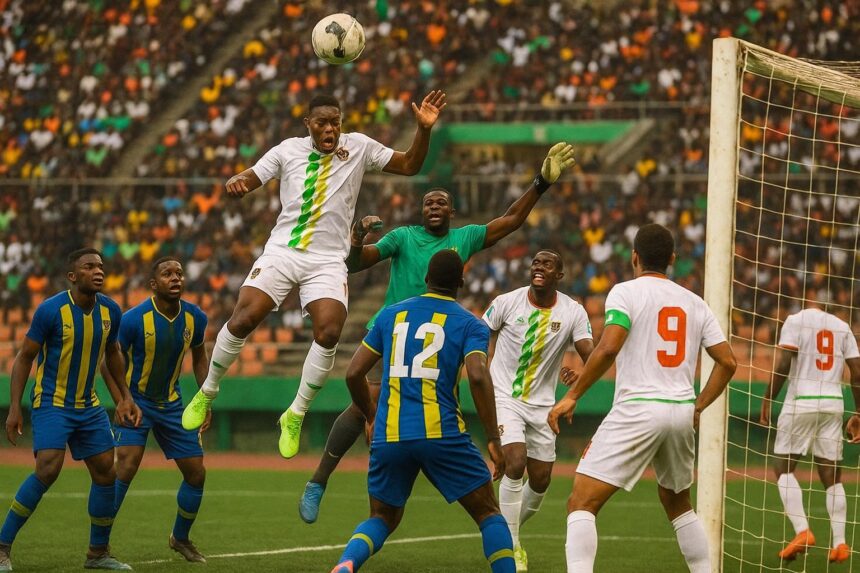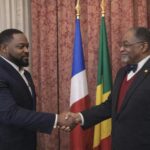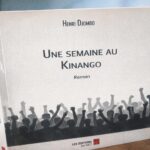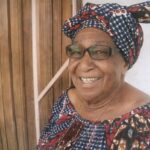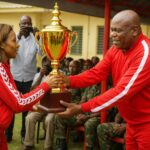Brazzaville night under pressure
Friday 5 September 2025, Massamba-Débat Stadium hummed with vuvuzelas, red-green flags and cautious optimism. Supporters had come hoping to erase painful memories of previous setbacks and relaunch Congo’s march toward the 2026 FIFA World Cup. Ninety minutes later, the mood was mixed rather than euphoric.
- Brazzaville night under pressure
- Scoreline that says enough
- Turbulent road to Group E
- From withdrawal to comeback
- First half of effort, little craft
- Moussavou’s moment of belief
- Equaliser that hurt doubly
- Conditioning questions resurface
- Blunt edge in final third
- Fans keep the faith—just
- Group E landscape
- Calendar turns quickly
- Technical staff shuffle
- Economic and civic stakes
- What the numbers say
- Next steps for supporters
- Hope still burns
Scoreline that says enough
Congo and Tanzania parted on a 1–1 stalemate, each side scoring after the break. Deschan Moussavou lit up the stands on 68 minutes with a crisp finish, but Selemani Mwalimu silenced them in the 84th, steering a low drive beyond Christoffer Mafoua. Two points slipped away.
Turbulent road to Group E
The draw follows a rocky campaign: a 2–4 defeat to Zambia, a voluntary no-show versus Niger, a bruising 1–6 double against Morocco in 2023 and 2024, plus forfeits against Zambia and Tanzania last March (Fédération congolaise de football). Each stumble amplified public worry and media scrutiny.
From withdrawal to comeback
Last spring the sports ministry briefly considered exiting the qualifiers to avoid more embarrassment and fines. A chorus of supporters, former internationals and pundits argued the Red Devils deserved to fight on. Under that pressure, authorities reversed course and the team laced up again, starting Friday’s tie.
First half of effort, little craft
Congo opened energetically, pushing wide through Prince Ibara and relying on Déogracias Bassinga’s bursts between the lines. Yet clear-cut openings were scarce. Tanzanian keeper Metacha Mnata handled long shots calmly while skipper Erasto Nyoni marshalled his backline, making the 0–0 halftime scoreline unsurprising.
Moussavou’s moment of belief
Midway through the second half, the breakthrough arrived. Bassinga slipped a well-weighted pass behind the full-back, and Moussavou, timing his run, beat Mnata at the near post. The stadium erupted, smoke flares blooming red. Players huddled in relief, sensing a corner finally turned.
Equaliser that hurt doubly
Fatigue soon crept in. As legs dulled, Tanzania pressed, launching crosses toward Mwalimu and Mbwana Samatta. On 84 minutes, a loose clearance landed kindly for Mwalimu, who stroked home. The sudden hush underlined an old pattern: Congo often concedes late, a weakness coaches struggle to mend.
Conditioning questions resurface
Fitness has been labelled Congo’s “congenital fatigue” by radio analyst Marc-Alain Soukou. The team faded similarly against Zambia and Morocco. Interim trainer Jean-Ghislain Tchicaya, appointed in June, insists workloads have been adjusted. “We run enough, but decision-making under stress is another muscle,” he told reporters post-match.
Blunt edge in final third
Beyond stamina, creativity is thin. Aside from Bassinga’s assist, the Red Devils produced one genuine chance: Migon Koto volleying over from close range. With tiki-taka absent, crosses drifted harmlessly. Former striker François Bemba notes the side often “freezes” within twenty metres, unsure whether to shoot or combine.
Fans keep the faith—just
Outside Gate C, supporter Mireille Mouanga shrugged, flag still draped on her shoulders. “They fought,” she smiled, “but we need wins, not flavours of victory.” Around her others debated tactics, yet most applauded the players onto the team bus, a small sign confidence has not vanished.
Group E landscape
Morocco, unbeaten and mathematically qualified, remain the undisputed leader. Zambia trail but retain a cushion. Congo sit adrift in the middle pack alongside Niger and Tanzania, all separated by tight margins. With three fixtures left, the race for second—and a possible playoff—stays wide open.
Calendar turns quickly
The Red Devils travel to Niamey next month, host Morocco in November, then close away in Lusaka. Staff members emphasise rest and injury prevention, while the federation considers chartering a direct flight to Niger to shorten transit. Details, they hope, can translate into fresher legs.
Technical staff shuffle
Tchicaya’s appointment followed the departure of Paul Put in April. The new staff promotes youth, handing minutes to 19-year-old centre-back Ulrich Makouta. Whether this blend of experience and promise can gel in time is the central unknown of Congo’s qualifying story.
Economic and civic stakes
Every qualifier ripples beyond football. Matchday trade for vendors around Massamba-Débat surged by an estimated 20 %, according to a municipal officer. Victory bonuses also inject morale within the squad. Authorities underline the unifying image a successful campaign would project for Brazzaville and the wider republic.
What the numbers say
Across seven games, Congo have conceded 18 goals, scoring nine. They average 3.4 attempts on target per match, below the group mean of five. Conversely, their pass completion has risen to 80 % since June camps. The dilemma: tidier build-up has yet to turn into goals.
Next steps for supporters
Tickets for the November home clash with Morocco go on sale 15 October at the stadium, banks and online platforms, prices ranging from 3 000 to 15 000 FCFA. Organisers advise early purchase and public transport use, with extra BRT buses scheduled from Talangaï and Bacongo districts.
Hope still burns
Captain Chancel Mbemba, speaking in the mixed zone, struck a defiant note: “We owe our people a final push. Maths say we’re alive, so let’s fight.” On Friday, Congo drew rather than soared, yet echoes of that pledge linger. The World Cup dream remains bruised, not broken.

